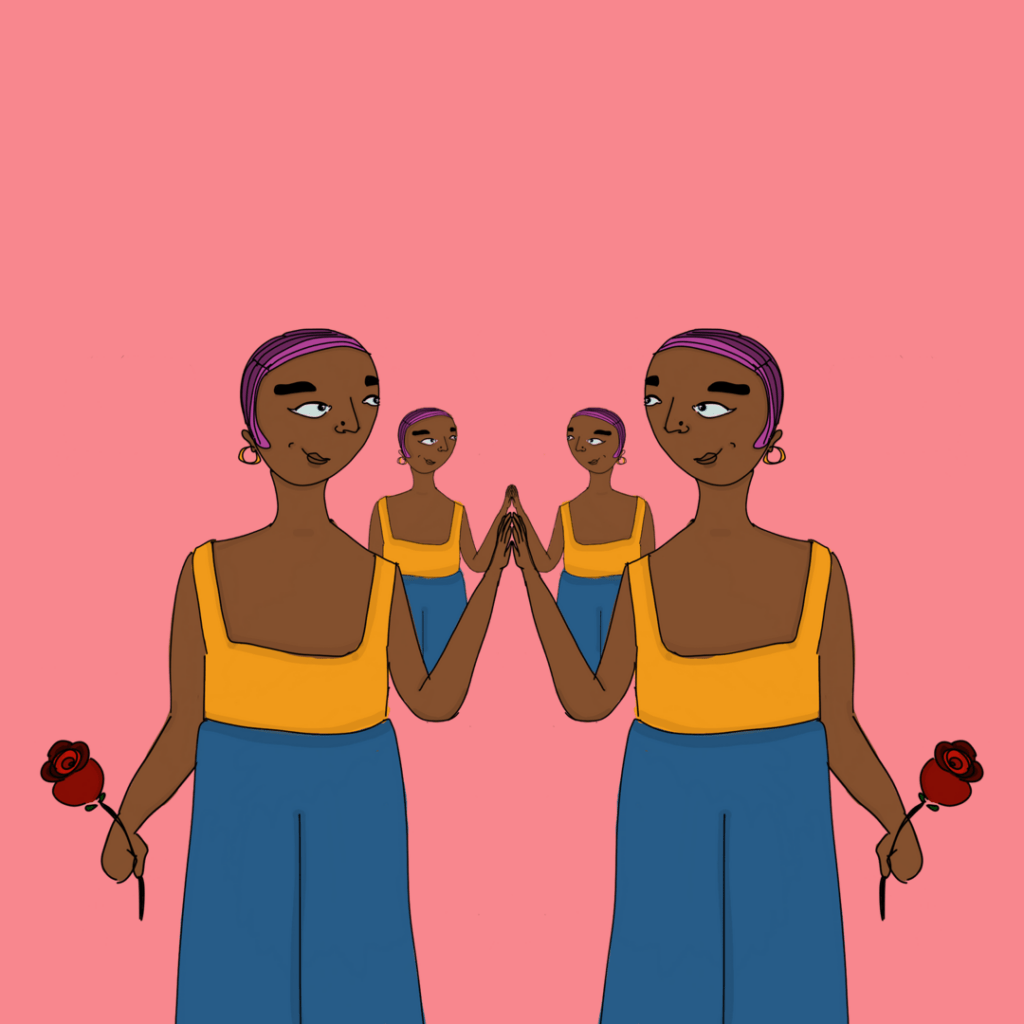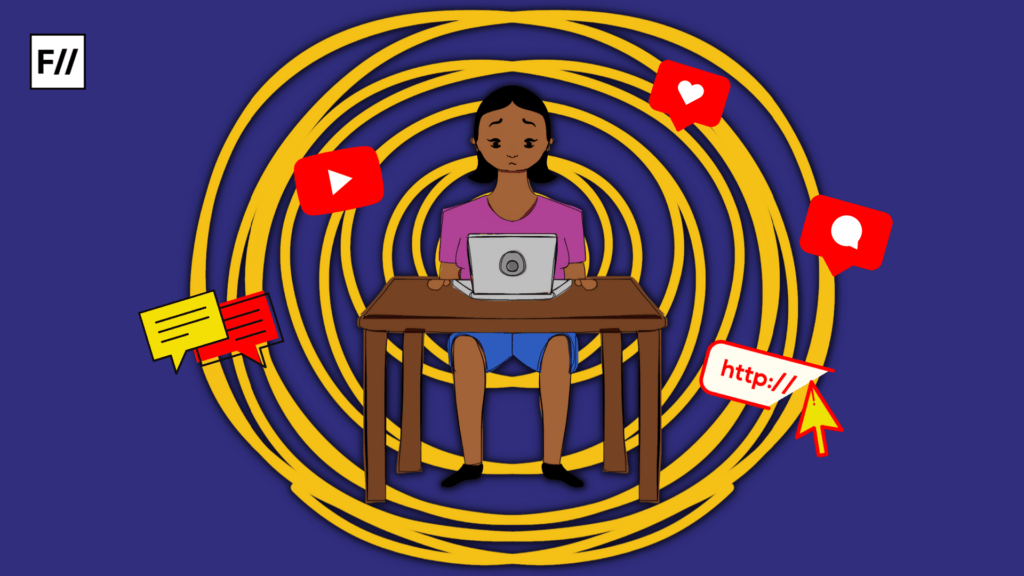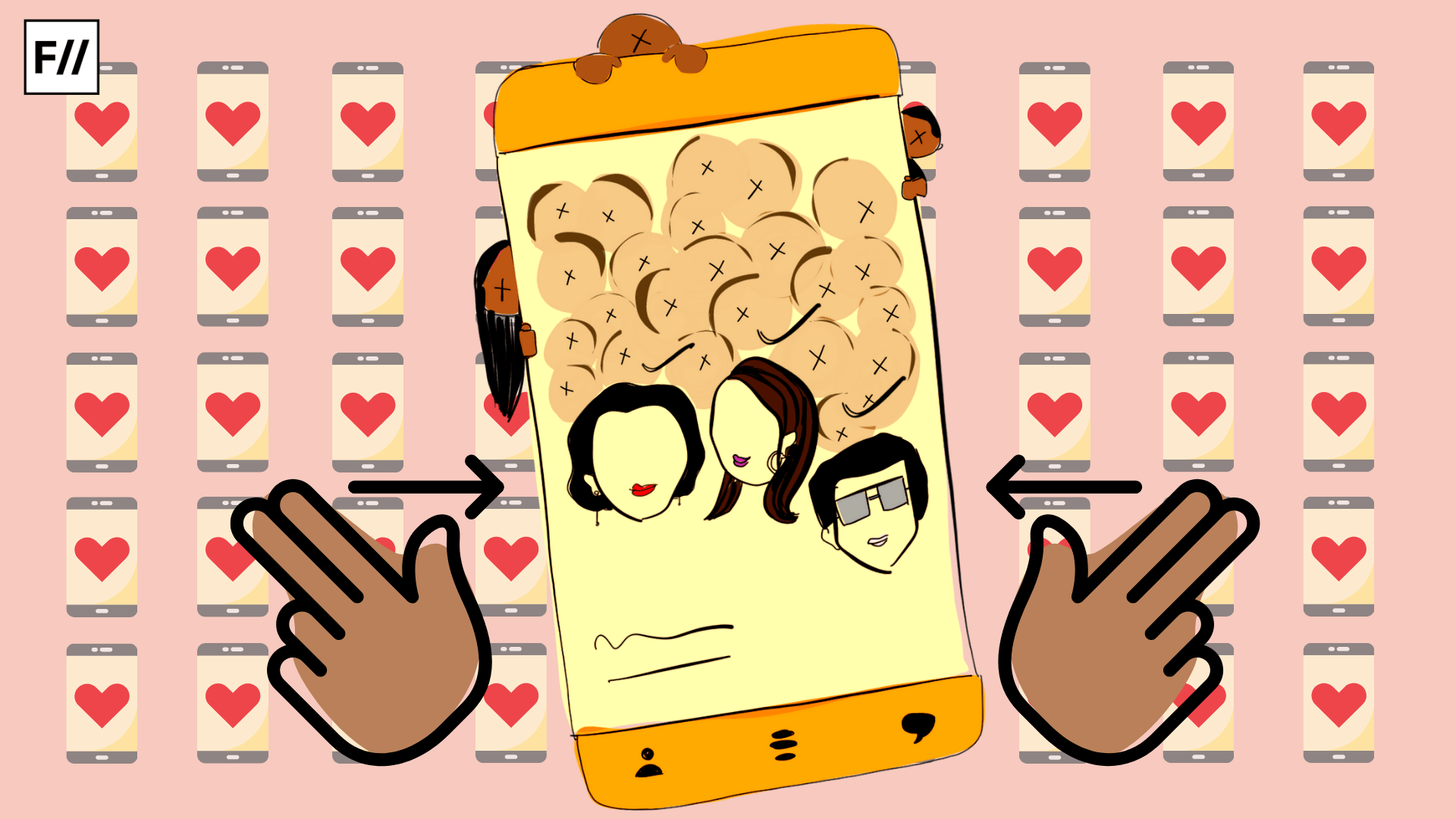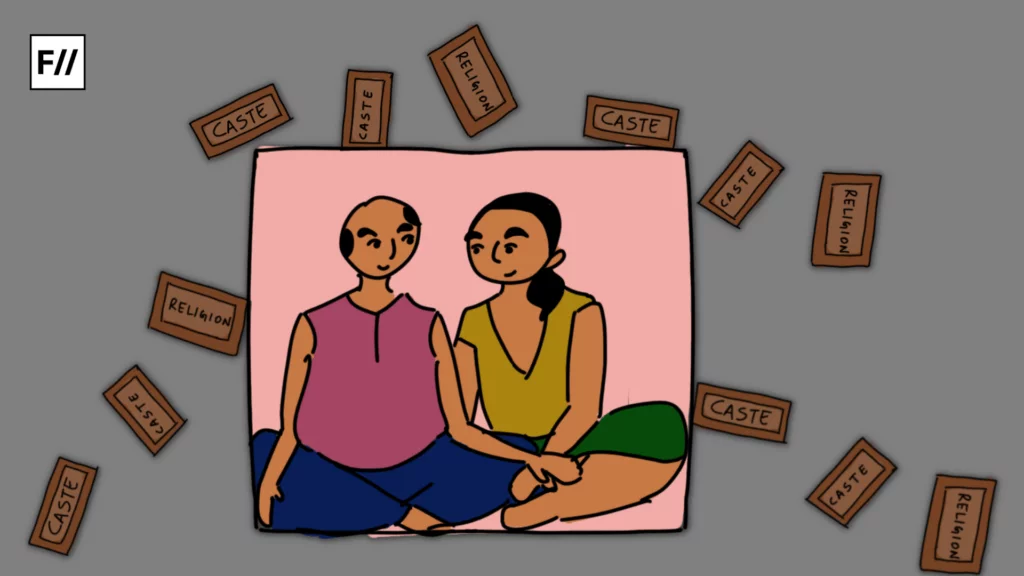The research and writings on love and dating in India are predominantly data-driven and based on the analytics of dating apps. The authors rarely reveal their own path of finding love in all forms and relationships. This could be due to the disassociation of love from academics or the emotional labour it entails to be reflexive about one’s own life.
Indians in general and Malayalis in particular, are seen to have a clear compartmentalisation of what is considered public and private lives. Kerala is known for its anti-right-wing politics, literate population, and secularism which is also reflected on its limited but relatively high statistic (19.65 percent) of inter-caste marriages. In Kerala, ‘Love marriage’ in its truest sense is still an exception and not the rule.
Dating culture is not mainstream in the Malayali society i.e., it is neither publicly accepted nor family-approved. However, it does thrive as an active practice among the young population who keeps it private and to themselves. This article is part of an effort to analyse dating experiences of Malayalis, including myself. (It should be noted that the article is only based on 20-something, middle-class (and/or upper middle-class) English-educated adults, who use dating apps.)

As a 27-year- old woman, dating apps are neither a novelty nor an old habit. They came into my life somewhere in the early 20s, when I felt tired of being mansplained by men who would try to psychoanalyse my dating choices and explain why I should date them instead of the others. But in this article, I would like to be specific and reflect on the contemporary dating habits in order to explore the love culture of a 20 something Kochiite. Kochi is the only city in Kerala which is comparable to other metropolitan cities in India – the trend hub of the state. I barely used the dating apps in Kochi before 2018. I moved out of the country for two years and came back to my Amma’s home in Kochi, and the city seemed way lonelier than I remembered, with no friends or romantic partners. Few clickety-clicks and there I was on Bumble.
There are various dating/hook-up apps from Tinder to Hinge to Coffee meets Bagel, and Bumble. I resorted to Bumble, a self-proclaimed gender-sensitive app where women ‘make the first move‘. Though research shows minimal difference between Tinder and Bumble, the restriction imposed on men to the send first message is a huge relief – the bar is unfortunately quite low when it comes to gender sensitivity; be it technology or people.
‘Being chill‘ is a perfect way to breach boundaries, consent and to casually met out political insensitivity without opposition. People can now freely disregard emotions and consequences. This is the perfect opportunity to turn everything into a joke. The fear of being uncool restrains women from addressing disrespect in such settings. The date-ability accorded to women of all groups within private spaces and the culture of ‘chilling‘ which facilitates no-strings or accountability attached situationships, create a perfect paradise especially for dominant caste, cis-men
Technology imbibes the creator’s values. Research shows that users of dating apps cite various reasons for joining them ranging from seeking a life partner/ a relationship, casual dating, sex and hook-ups to networking, entertainment and marketing. Most of the matches I have had have asked me this question, ‘Why are you on the app?’. I have given different answers to different people because it is a mix of reasons.
From my own experience and that of my social circle who find dates online, ‘situationships’ are considered a natural outcome of the current sociality of love. Situationship is a romantic relationship which has progressed or is more than a friendship but is not an official relationship – a coinage arising out of an apparent fear of love. Situationship is an outcome of capitalism actively commodifying love. It reproduces exploitation and patriarchy by creating ‘chill people’.
Being chilled out, especially in the case of women, is hailed as a virtue where you remain unbothered by everything from personal issues such as consent and care to social issues such as political incorrectness. It does not demand reciprocity, which enables people to invest minimal amount of time and effort into your personal life. This in turn exalts the bare minimum to the ideal and normalises compliance to a flippant dating culture. It also perfectly fits the skewed work-life balance of 20-something young adults, particularly in the private sector.

Marriage is a just one alternative out of different types of partnerships you can engage in or refuse. However, in our society, being single or choosing an alternative romantic arrangement to marriage requires several acts of courage as it stands against the popular moral and socio-cultural set up. Familial approval is a pre-requisite to all personal affairs, especially marriage. I was having a discussion about inter-caste marriages with two of my friends from the academia, when one of them brought up how they always knew they would marry someone from the same caste because ‘it is just easier‘. Therefore, date-ability and marriageability are two different situations. You can date whoever you find attractive but you stick to the (manu)script when it comes to marriage.
‘Being chill‘ is a perfect way to breach boundaries, consent and to casually met out political insensitivity without opposition. People can now freely disregard emotions and consequences. This is the perfect opportunity to turn everything into a joke. The fear of being uncool restrains women from addressing disrespect in such settings. The date-ability accorded to women of all groups within private spaces and the culture of ‘chilling‘ which facilitates no-strings or accountability attached situationships, create a perfect paradise especially for dominant caste, cis-men.
The culture of chilling helps to silence and ‘tame’ persons who question the convenience afforded to the men of the group. On the other hand, feminists are shamed for standing up for gender equality. The cis-het manifesto of chilling roughly seems to boil down tho this –Feminists need to stop overreacting. We imagine a world where every feminist would be given a chill pill each. A world where we could enjoy misogyny and live with no complaints. We would just hug it all out and women could get back to the kitchen.
When consent becomes easier to not understand
#Metoo and strengthening of online feminist networks have revealed to us how the most basic dating courtesies sexual and emotional, are completely lost on a lot of people. Even saying no to ‘easy tasks’ such as going on a date is regarded as something that perhaps can be reversed with a little nudge. I have at many times gone on dates because of incessant requests after I initially decline the offer. We grew up listening to ‘What would others think?‘, where being palatable to others is a virtue of great importance, especially for women.
Arguments and debates are considered as fights and we are not raised to be constructively confrontational. It is sometimes easy to agree to meet than being tagged a ‘bitch‘. Bitch is a word which is thrown around so much and almost always directed at women who express their dissent. Even if you are strong enough to be unbothered by a stranger’s opinion, that doesn’t preclude you from being affected by it.
Also read: ‘You Must Be Mysterious, Yet Mainstream’: The Taxing Act Of Being A Woman On A Dating App
A constantly internalised thought which furthers such compliance is ‘What is the harm in it?’. As long as there is no damage or probable damage, no means a maybe. This extends to a lot of things. I have been told of many experiences by my friends, where breach of consent is expected to be treated as normal. From insisting to not wear a condom; to refusal to stop in between sexual contact; to compelling to go on a date; to forwarding intimate photos without asking, are all breaches of consent which need to be addressed.
When it comes to dating online, we are trying to get along with someone who is a stranger. The code of chilling mandates that we, especially women, do not overreact, are cool and loveable while also being interesting. In addition, heterosexual cisgender men have always acted confused about consent: ‘I did not think you would mind it’, ‘I did not think of it as coercion’, ‘I thought you were just shy’, ‘I just really wanted to meet you’, ‘I was in my head’ and so on, are cliché sentences ready to be rolled out as and when they please.
We are seeing a generation of men who embrace the sexual liberation of women which came out of feminist movements. However, they do not want to take it too far that it might end up as a minor inconvenience. It also interesting to note how they are so on point about issues of consent when it is about themselves.
However, 20-something adults do not explicitly belittle oppressed caste individuals because ‘we are all woke‘. But they would bring up their own caste in conversation without a second thought, especially in the context of marriage. There is a difference between discussing caste and being casteist. Most of the young population exalts caste blindness which effectively denies the existence of caste while being strongly casteist in their own preferences. I would encourage everyone to talk about caste, check our privileges and stop denying its existence

What has online dating taught me?
In today’s era, we live and date online. We are modern and our lives, metropolitan. However, we have made very minimal progress in terms of addressing inequalities. Gender, caste and class inequalities remain solid and keep widening. The culture of ‘chilling‘ in general and in romantic relationships in particular, has worsened the situation by silencing differences. We exalt indifference. We are just chilling, not sharing, debating or loving.
In Indian urban spaces and especially in Kerala where last names are usually your father’s first name, caste is not as obvious as in the other parts of the country, though people make sure they subtly figure out one’s caste. On dating apps, women usually do not put in their full names in order to avoid stalking and to draw less attention.
I have caste passability i.e., the ability to pass as a dominant caste woman, which emerges from my relatively lighter-skin tone, and middle class privilege which affords me the choice to dress ‘fashionably‘ and to fluently converse in English. This has always given me an inside pass into the conversations of savarnas.
However, 20-something adults do not explicitly belittle oppressed caste individuals because ‘we are all woke‘. But they would bring up their own caste in conversation without a second thought, especially in the context of marriage. There is a difference between discussing caste and being casteist. Most of the young population exalts caste blindness which effectively denies the existence of caste while being strongly casteist in their own preferences. I would encourage everyone to talk about caste, check our privileges and stop denying its existence.
The surprise thrown at me in terms of my caste is not extended to my sexuality as a bisexual. My bisexuality is welcomed everywhere and is ‘approved‘ by cis-het men. They light up at the thought of ‘lesbian action’ and compare it to the ‘unthinkable’ gay sex. The contempt towards gay sex comes up from the misogynistic tendency where women are seen as the objects of pleasure. A position exclusively reserved for women.
Nevertheless, I prefer to come out of the closet in terms of my caste and sexuality. I want to associate with people who know who I am. But it is quite draining. It is harder but it is better.

In addition, most of the matches on dating apps that I have got are from similar class backgrounds. Tastes and preferences form through our social and cultural upbringing. It takes constant introspection to identify the elitism which is so ingrained within our daily habits. From choosing expensive cafes, bars and restaurants to planning impromptu trips and nights out; dating has become a consumerist act of love only to be afforded by the privileged.
We need to unlearn and start learning how to love one another, whatever be the kind of equation we wish to form. As long as we do not, we will not be able to recognise the alienation we feel in everyday life and address the need for intersectional approaches towards parity. We must reinvent our culture of love and sense of community. It is no less than a revolution.
Also read: Who Would You Swipe Right?: Dating Apps And The Basis Of Their Problematic Algorithms
Uthara Geetha is an independent researcher. She is an Erasmus Mundus Scholar of Gender Studies from University of York (UK) and University of Oviedo (Spain). She also holds a master’s degree in Applied Economics from Centre for development. Her main research area is on the intersection of caste, class and gender. She may be found on Instagram
Featured Image: Ritika Banerjee for Feminism In India
About the author(s)
Uthara Geetha is a doctoral student at the University of Oviedo (Spain) working on Decolonization, gender and the politics of creative solidarities within new South-Asian Transnational Literature under the Marie- Sklodowska- Curie Actions scholarship funded by the European Union. She was an Erasmus Mundus scholar (2019-21) in Gender Studies University of York (UK) and the University of Oviedo (Spain). She also holds a master’s degree in applied economics from the Centre for Development Studies, India. Her main research interest is in the intersections of gender
with race, caste, and class within a transnational framework inspired by her Dalit identity. In addition to her academic works, she also writes online articles on popular culture from a decolonial intersectional feminist perspective.





This was lovely